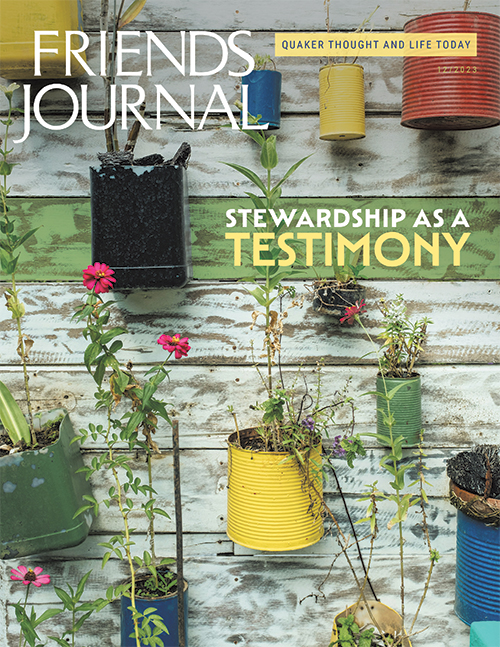More than words
How can we Quakers turn our words of concern and care for one another and our fellow beings into more than words? Holding one another, Quaker or not, “in the Light,” is a hopeful expression, but is it an action or a stimulus to action that leads to outcomes in reality? What difference can our words produce in relieving the suffering of violence and undeserved death, for example, of Israelis and Palestinians, our fellow human beings, and the acts they inflict upon one another despite their shared humanity?
We observe, reflect, and share our sentiments in words with one another. Do we offer actions that change their actions to peace and mutual movement toward new ways to stand together, to make our shared world livable in peace and well-being for all?
As individuals and people acting together many of us have experienced actively undertakings to make ours a better and more peaceful world without violence and distress. We must help our fellow beings around the world come closer together with such shared intentions.
Maurice G. Eldridge
Swarthmore, Pa.
Friendly persuasion
I haven’t watched TV news in years. I do have an online subscription to the New York Times, but mostly read the articles that have a cultural, archeological, or wildlife focus. Today, for some reason, I delved more deeply into political subjects. Finally closing the Times, I saw myself dribbling into depression. But next I clicked on a Friends Journal email and read Eric E. Sabelman’s “Empty Boots” (FJ Nov.) Thank you. My spirits and commitment to peace have been lifted up and renewed.
Donna Hartmann
Bethlehem, Pa.
Sabelman’s story brings to mind the limerick “The Two Cats of Kilkenny.” So many present-day wars have ended in negotiations, albeit after a lot of suffering, many casualties, and tremendous devastation. Pacifism can stop wars by denying them soldiers, and friendly persuasion can peacefully resolve conflicts before they escalate.
There once were two cats of Kilkenny,
Each thought there was one cat too many,
So they fought and they fit,
And they scratched and they bit,
Till, excepting their nails
And the tips of their tails,
Instead of two cats, there weren’t any.
Sami Cortass
Dallas, Tex.
The author adds: The metaphor of a soldier’s empty boots was inspired by American Friends Service Committee’s Eyes Wide Open exhibit opposing the Iraq War, which I learned of shortly before writing the story. In May 2008, I was involved in bringing Eyes Wide Open to Stanford University. A Quaker graduate student, Daniel Steinbock, took pictures of this installation and posted them on Flickr. In the story, Simon inspires people to try “another way,” a phrase that stands for every kind of peacemaking you can think of.
Eric Sabelman
Santa Rosa, Calif.
The incomplete work
I continue to be in the Quaker community because of the values and ideals Lauren Brownlee mentions (“How Quaker Testimonies Can Combat White Supremacy,” QuakerSpeak.com Oct.). We all have been conditioned by centuries of harmful White supremacy and, in many cases, don’t know it. In the future, I pray that we open our minds, hearts, and doors to welcome and worship with people who don’t look like us.
Ray Regan
Downingtown, Pa.
As a White South African, I have known racism at its very, very worst—and have spent the better part of my lifetime protesting against it, often at some personal risk. As an environmentalist, the Quaker testimony that there is that of God in everyone is a lovely reminder of the importance of our (bio)diversity, the importance of our differences in creating a (holy) whole. By listening and looking with loving attention, we get to know who the other is: we learn, we expand, we grow, and the other ceases to be other and becomes us. I have puzzled over what equality means, and have reached the conclusion that for me it means we are all equally important—if one of us is missing, unrecognized, unheard, Creation is incomplete; God’s work is incomplete.
Helen Holleman
Grahamstown, South Africa
Living in Pentecost
I’ve never been to a Vineyard church (“All the Way Back to George Fox” by Andy Stanton-Henry, FJ Oct.), but am familiar with its origins and its spiritual emphasis, and consider it similar to the other charismatic mega churches I used to occasionally attend. Yes, we may all benefit from the cross pollination of worship styles and the varying voices in the Christian community. But a word of caution: the intoxicative ambiance of these worship settings can sometimes lead to the diminishment of critical thinking and discernment, and often at a very deep and disturbing cultural level. Many charismatic churches, while they encourage congregants to sway to loud music and raise their hands to Jesus, adhere to antiquated biblical fundamentalism, push back against modern science, subordinate women, and implicitly promote malevolent conspiracy theories. It’s therefore important that one look beyond the feel-good nature of these services and examine the church’s entire belief culture before making any sort of commitment to it.
John Thomson
Penn Valley, Calif.
The difference I see in these two movements is that the charismatic movement sees itself in the interim period, where the Holy Spirit rules until Christ’s return. The early Quakers felt they were living in Pentecost: Christ had returned and his coming was in the heart.
Chris Stern
Media, Pa.
Creating new fusion recipes
The article contributed by Rhiannon Grant, bold explorer that she is, “Confidence in Complexity” (FJ Oct.) quite took my breath away. I followed her paths as if I had gone along with her. We do wrestle sometimes trying to find the universal truth when we are only able to see parts. It’s those discoveries she describes that sustain her soul, while her childhood foundation gives her strength.
Megan Shook
Baltimore, Md.
I love Grant’s cooking analogy, as creating great new fusion dishes involves many experiments before appealing broadly. Ashoka sent Buddhist emissaries to the Middle East a few centuries before Jesus, allowing enough time for cultural sharing and fusion within the Roman Empire to influence Rabbi Jesus’s discernment. The Dalai Lama and Archbishop Desmond Tutu got along very well together. Regarding Pagans, it may be important to remember you can find God in nature, but nature is not God, which is similar to comparing ideals to reality, where balance is important. The Internet is expediting religious diversification and fusion for our younger generations globally.
George Gore
Chicago area, Ill.




Comments on Friendsjournal.org may be used in the Forum of the print magazine and may be edited for length and clarity.